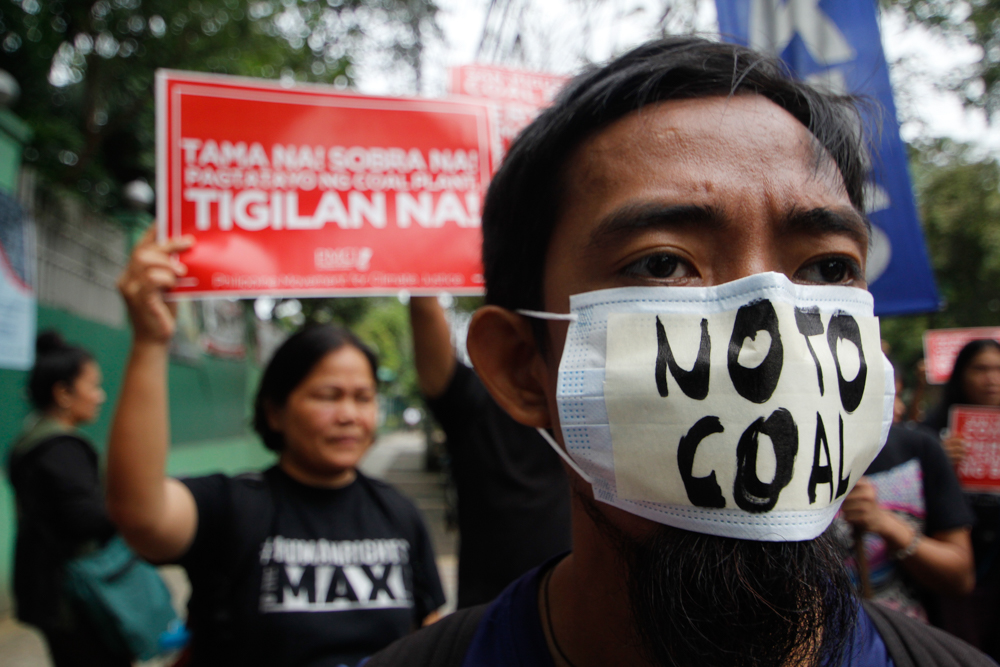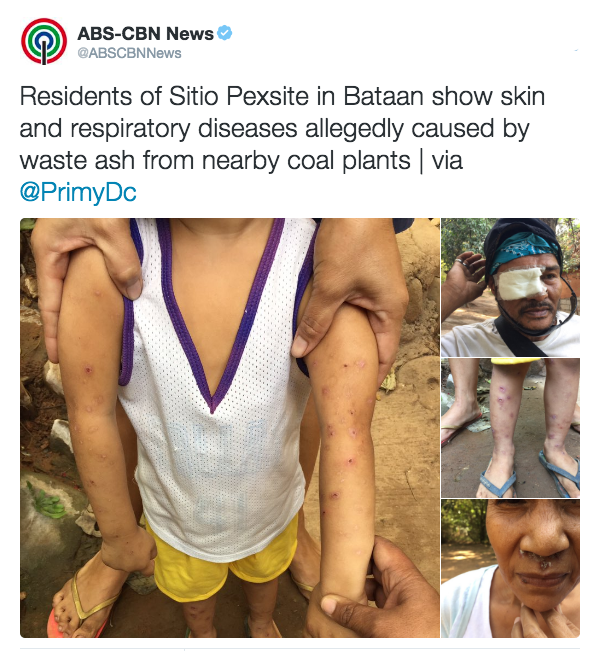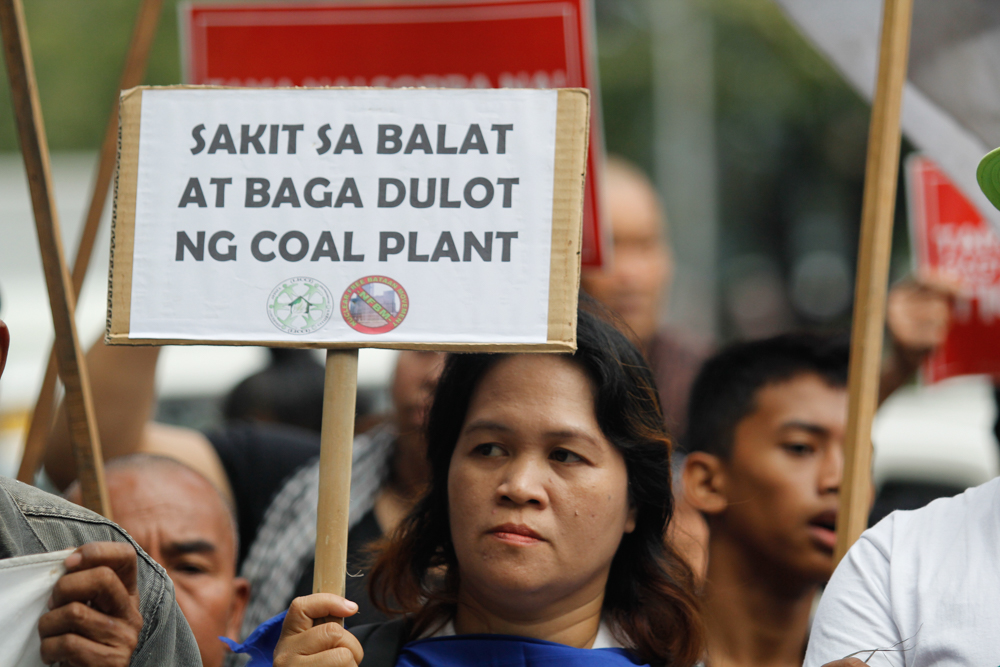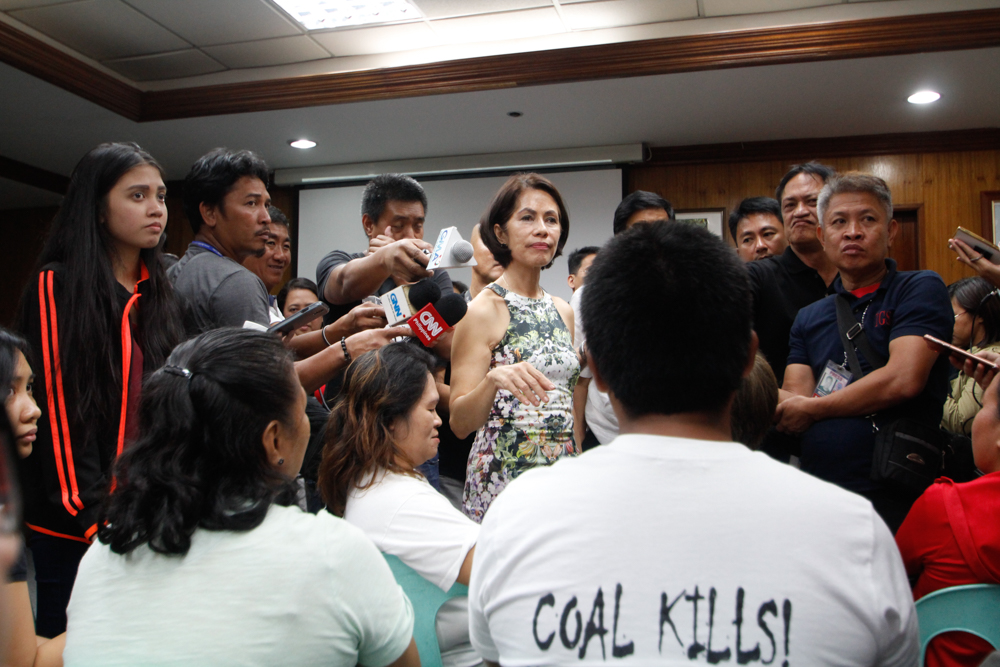By Chuck Baclagon
The year started on a bleak note here in the Philippines, especially for the residents of Limao, in Limay town in the province of Bataan. Ash from the coal plants of both Petron and San Miguel Consolidated Power Corporation (SMCPC) spilled to nearby communities, which caused sores, irritations, and cardiovascular ailments.
San Miguel, one of the largest conglomerates in the Philippines, is implicated in the recent coal ash spill as residents of Limay filed complaints that the ash residue caused them to fall ill and damaged their houses and crops.

San Miguel, one of the largest conglomerates in the Philippines, is implicated in the recent coal ash spill in Limay, Bataan. Local residents trooped today to the national office of the Department of Environment and Natural Resources to demand the halting of the operations of San Miguel Consolidated Power Corporation’s coal plant in their town, located 100 kilometers north of Manila. © AC Dimatatac/350.org
Operators of the facilities in Bataan admitted that the ash covering the houses of residents in Limay may have come from their dumpsite. In response, the Department of Environment and Natural Resources (DENR) ordered the plants of Petron and San Miguel corporations to stop operations.
Last Wednesday, I joined some local residents and anti-coal activists troop to the national office of the DENR to demand the halting of the operations of the coal plants.
In the dialogue, DENR Secretary Gina Lopez guaranteed that her agency will investigate the matter and that she will personally visit Bataan. She also tried to facilitate a phone dialogue with Ramon Ang, the president of San Miguel Corporation who continued to deny responsibility for the damage the coal plants have caused.
Ramon Ang: check your privilege

In the dialogue we also heard Ramon Ang readily dismiss the complaints and the incidences of skin irritation simply as scabies, caused by the poultry and pets raised by the community .
Such a statement clearly reflected how polluters rationalize their exploitation of people and ecosystems. Thankfully, Gina Lopez was not easily fooled by Ang’s outright dismissal and his attribution of the skin diseases to dogs and chickens.
DENR’s Environmental Management Bureau in Central Luzon has already ordered SMCPC to stop any activity inside its coal plant in the wake of the ash spill. We are hopeful that the investigation would pave the way for the eventual closing of the coal plant and for SMCCPC to be held accountable for the adverse impacts of their facility to the people living there.

Local residents together with the Philippine Movement for Climate Justice, Sanlakas, Koalisyon Pabahay ng Pilipinas, Kilusan para sa Pambansang Demokrasya, Health Care Without Harm and Coal-Free Central Luzon trooped today to the national office of the Department of Environment and Natural Resources (DENR) to demand the halting of the operations of San Miguel Consolidated Power Corporation’s coal plant in Limay, Bataan. © AC Dimatatac/350.org
I hate to say I told you so
Last year a pioneering study was released by Harvard University on the impacts of emissions coming from coal combustion as a part of the growing body of health and scientific research on the adverse impacts of coal-fired power plants, on the health of nearby communities.
The findings of the research should have been sufficient basis for governments and corporations to pursue cleaner and safer energy options. The current health problems that gave rise to the peoples’ protests are clear manifestations of what has already been stated by the Harvard health study.
It’s one of those things where I hate to say I told you so, but pursuing coal is a proven bad decision. Not only because of its impacts but also because it consigns us to depend on fossil fuels that we either have to mine or import from other countries.
Energy, economics and equity
Another recent study commissioned by the World Economic Forum shows that solar and wind energy are now at the same price or even cheaper than new fossil fuels in over 30 countries.

Environment Secretary Gina Lopez speaks with residents from Limay, Bataan affected by a reported ash waste spill, at the DENR on Wednesday. The group demanded the closure of the coal plant owned by San Miguel Consolidated Power Corporation. © AC Dimatatac/350.org
It is both ironic and tragic then that there are companies that continue to operate destructive coal plants and dump bottom ash harmful to nearby communities, and its is more infuriating that the Department of Energy is making a mockery of the Filipinos whose health and environment are already severely affected by the adverse impacts of coal combustion by continuing to peddle coal to would be investors.
Coal has no place in the Philippines’ energy mix, not only because of pollution but more so because it is the primary source of carbon dioxide that causes global warming. We can’t let the coal industry hijack our future. We must keep global warming within 1.5 degrees Celsius for a fighting chance to survive. This requires halting all new fossil fuel development now.
Our obligation to endure
We have our work cut out for us. In the face of our collective extinction as a species, our obligation to endure challenges us to rise up and strive harder than before to challenge the impunity of corporate polluters who have wreaked havoc on people and ecosystems, have deprived communities of their livelihood and dignity, and more so have imputed blame on the victims for their plight.
Even so we must also stand up to governments that protect such corporations and reinforce a status quo where majority of their people remain in the margins of decision making process for matters that relate to their rights to live and thrive.
The climate crisis should force us to examine our unjust power relations and force us to build a society far better than the one that we have –the one that brought us to this crisis in the first place.
